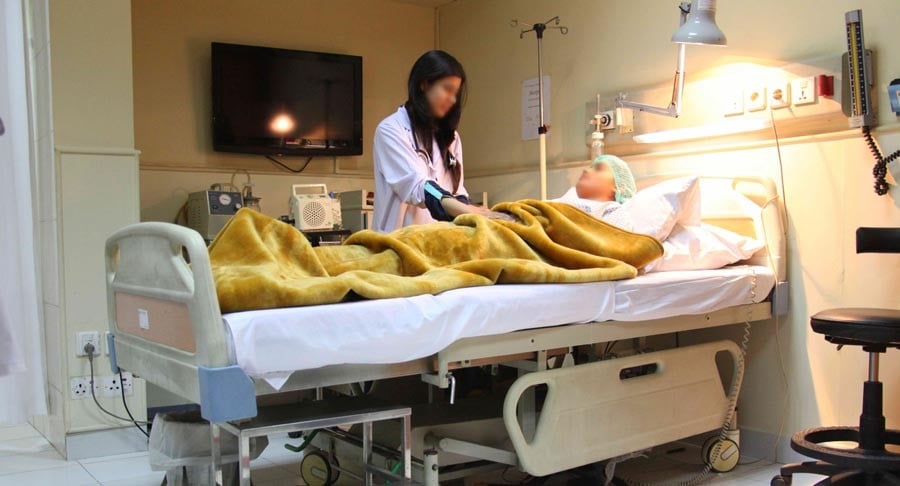
Both private and public hospitals lack facilities and are expensive too

Breast cancer diagnosis is mostly made at advanced stages in Pakistan as very few women go for regular self-checks or screening for breast cancer. Treatment is available according to the stage of the disease.
If detected at an early stage, the lump can be removed through surgery and without doing mastectomy or chemotherapy. But what happens is that most of the women diagnosed with breast cancer are at a stage where they have to get specialised and expensive medical treatment.
Cancer treatment facilities in the country are far less than what is required. According to international standards, there should be a cancer hospital for every 5 million people in a country but in Pakistan there is only one full-fledged cancer hospital -- Shaukat Khanum Memorial Cancer Hospital (SKMCH) -- in Lahore that has a branch in Peshawar as well.
Pakistan Atomic Energy Commission (PAEC) also has 18 cancer hospitals but these have a limited capacity. Of these 18 hospitals, there are two each in Karachi and Lahore and one each in Islamabad, Gujranwala, Faisalabad, Bahawalpur, Multan, Larkana, Nawabshah, Jamshoro, Quetta, D I Khan, Bannu, Peshawar, Abbottabad and Swat.
What course of action should be taken after breast cancer is diagnosed? Prof Areesha Zaman, Director, Medical Radiation Physics, says the decision about treatment depends on the doctor who determines the stage of cancer and then goes ahead with the treatment. "The staging process depends on different factors, including the size of the tumour, the number of lymph nodes affected and whether the cancer has spread to other parts of the patient’s body."
Zaman says the patients have to go for biopsy followed by surgery and, if required, chemotherapy and radiation. Quite often, all these processes have to be followed to ensure there is no recurrence of this disease.
Read also: What women know
Having worked as Chief Medical Physicist with the Institute of Nuclear Medicine and Oncology Lahore (INMOL) for more than a decade, Zaman says PAEC hospitals provide these services free of cost or at a subsidised price to patients.
However, she says, the problem is that due to high number of patients and limited resources, the wait time is long. "Besides, radiation therapy is hardly available in the government sector as most of the radiation machines are non-operational and out of order."
"Presently, because of shortage of radiation machines, patients have to wait for five to eight months for radiation treatment and during this period many patients die. Each machine costs Rs100 million approximately," she adds.
SKMCH is the only private sector hospital, she informs, that has radiation machines but it does not accommodate patients at an advanced stage. Even if they cannot be cured, she says, radiation reduces the pain that advanced stage patients have to endure.
Radiation is used to burn the tumour inside the body of the patient so that it does not move to some other part of the body later on.
Shahid Riaz Khan, an official of PAEC, tells TNS that they have extended services to different parts of the country but these are far less than what is required. For example, he says, "it is not possible to cater to the needs of Balochistan by having one hospital in Quetta."
As the population is scattered over a huge area, they are planning about developing satellite hospitals at different points and moving serious patients to central facilities. For want of resources, breast cancer patients travel from different parts of Balochistan to hospitals in Karachi.
Screening for the disease is done at the PAEC hospitals that have mammography machines installed there. Patients are also treated for different stages of cancer but the main issue is the limited capacity to handle patients.
The high cost of treatment of cancer, including that of chemotherapy and radiation, is too high, especially for those belonging to the lower-income groups. On an average, a patient has to spend Rs300,000 to Rs400,000 on a 15-day radiation. The expenses incurred on chemotherapy are in addition to this.
Dr Riaz Rahman, an oncologist, says the country will have to produce its own drugs in order to bring prices down and make them accessible to patients. Citing an example, he says, "imported Herceptin injection costs Rs1,30,000 in Pakistan but in India it is available for around INR 5,000." He says a group of businessmen in Sialkot have come up with a plan to form a consortium and launch a pharma company to produce cancer drugs locally.
Shortage of oncologists is also a major reason. Prof Areesha Zaman says there are around 110 oncologists in Pakistan and one major reason why people are not joining this field is that it is too difficult for a doctor to easily give up on a patient.
As the death rate of cancer patients is quite high, Zaman says, the doctors in postgraduate stage opt out of this discipline. Besides, she says, "the interest is also low because establishing private practice is expensive and one has to depend on the machinery installed at hospitals."